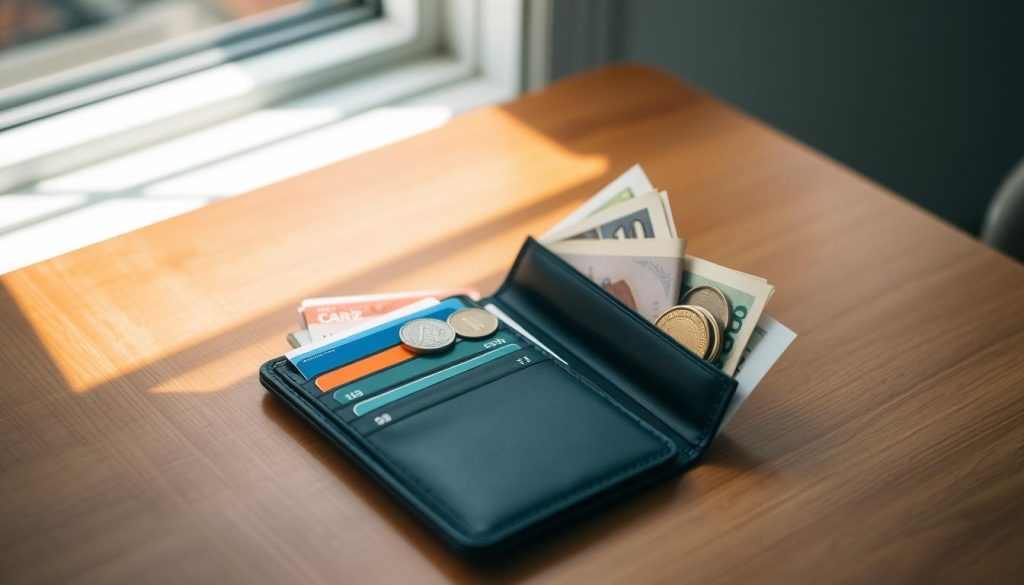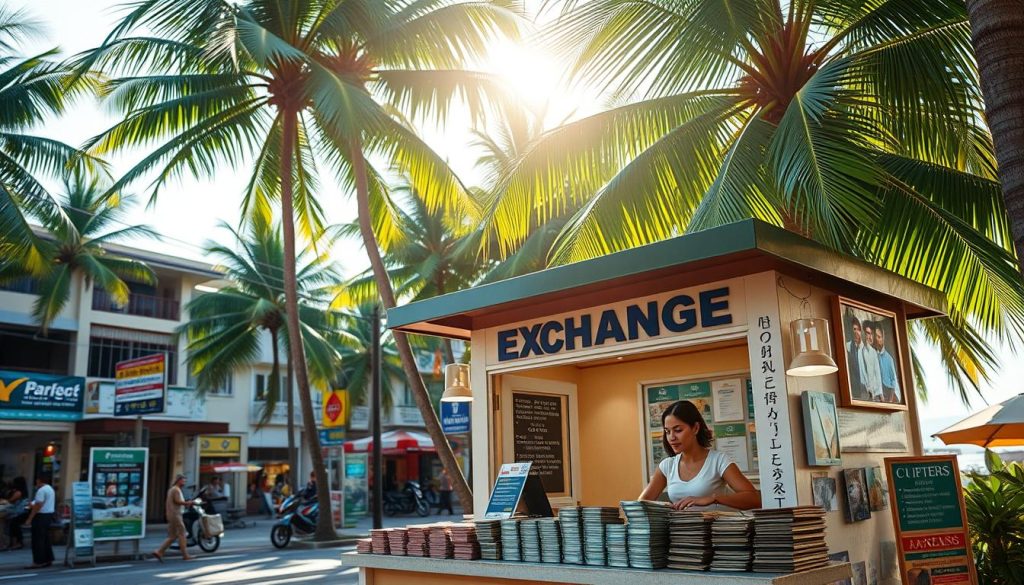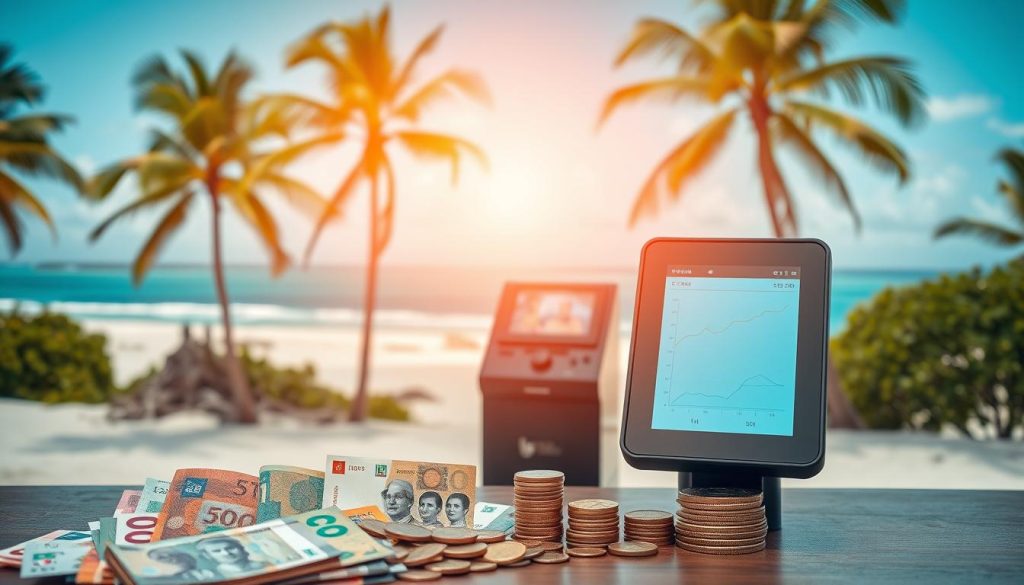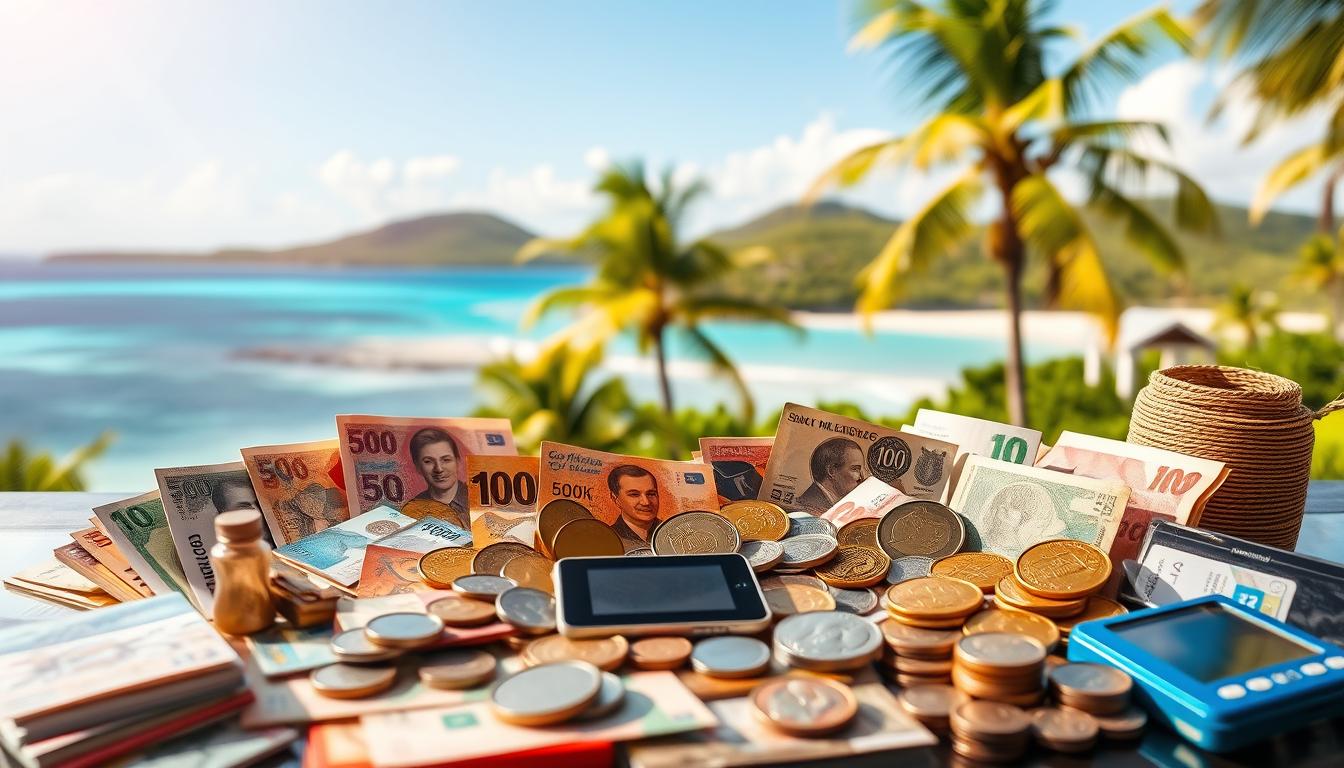Did you know that over 75% of the local population relies on cash for daily transactions? This makes understanding the local currency and payment systems essential for any traveler. Being financially prepared can save you time and stress during your trip.
When visiting remote destinations, knowing the exchange rate and how to access local funds is crucial. This guide will help you navigate banking, card usage, and digital payment options with ease. You’ll also learn practical tips for managing your money efficiently.
Whether you’re planning to explore the islands or simply relax, this guide ensures you’re well-prepared. Read on to discover everything you need to know about handling currency and payments during your travel adventure.
Understanding Currency Basics on the Cocos (Keeling) Islands
Understanding the basics of local money can make your trip smoother. The Australian Dollar (AUD) is the official currency used here. Knowing its features and how to handle it ensures hassle-free transactions during your stay.
Local Currency Features and Denominations
The AUD comes in both coins and banknotes. Coins range from 5 cents to $2, while banknotes start at $5 and go up to $100. Each note features iconic Australian figures and landmarks, making them easy to identify.
Most transactions on the islands are conducted in cash. ATMs are limited, so it’s wise to carry enough AUD for daily expenses. Local businesses may charge a small fee for card payments, so cash is often preferred.
Exchange Rate Insights
Understanding the exchange rate is crucial for budgeting. The AUD’s value fluctuates, so checking the rate before your trip can save you money. Avoid extra fees by exchanging currency at reliable banks or authorized counters.
Here’s a quick reference table for common exchange rates:
| Currency | Exchange Rate (AUD) |
|---|---|
| USD | 1.50 |
| EUR | 1.60 |
| GBP | 1.80 |
Being informed about the exchange rate helps you make smarter financial decisions. It also ensures you get the best value for your money during your travels.
Cocos (Keeling) Islands: Ultimate Travelers Guide to Currencies & Payments
Planning your finances ahead can transform your travel experience. Knowing how to handle local money ensures you avoid unnecessary stress and focus on enjoying your trip. This guide provides essential information to help you make informed decisions.

Why This Information Matters for You
Understanding local payment systems is crucial for a smooth journey. Without proper knowledge, you might face high fees or poor exchange rates. Being informed helps you save money and time, allowing you to immerse yourself in the local culture.
For example, carrying the right amount of cash ensures you can handle small purchases or unexpected expenses. Digital payment options like mobile wallets can also provide flexibility and security during your trip.
How Prepared Finances Enhance Your Experience
Well-prepared finances can dramatically improve your travel experience. They allow you to focus on exploring and enjoying your destination rather than worrying about money. Here’s how being financially ready benefits you:
- Avoid hidden costs like foreign transaction fees.
- Access better exchange rates by planning ahead.
- Manage unexpected expenses with ease.
Here’s a quick comparison of common financial pitfalls and how to avoid them:
| Pitfall | Solution |
|---|---|
| High ATM fees | Use banks with no international fees |
| Poor exchange rates | Exchange currency at reliable banks |
| Limited cash access | Carry a mix of cash and cards |
By making informed decisions, you can enjoy a smoother, more immersive travel experience. Being financially prepared ensures you’re ready for anything your trip throws your way.
Preparing Your Finances and Budgeting for Your Trip
Smart budgeting can make your trip stress-free and enjoyable. By planning your finances ahead, you can focus on exploring and creating memories rather than worrying about unexpected costs. Here’s how to prepare your budget and manage your money effectively.
Setting a Daily Travel Budget
Start by estimating your daily expenses. Consider costs like meals, transportation, and activities. Allocate a specific amount for each day to avoid overspending. For example, if you plan to dine out often, set aside more for food.
Don’t forget to include a buffer for emergencies. Unexpected expenses can arise, so having extra money ensures you’re prepared. Here’s a simple breakdown to help you plan:
| Expense | Daily Budget (AUD) |
|---|---|
| Meals | 30 |
| Transportation | 20 |
| Activities | 40 |
| Miscellaneous | 10 |
Tracking your spending in real time can help you stay within your budget. Use apps or a simple notebook to monitor your expenses.
Tips for Managing Cash and Cards
Carry a mix of cash and cards for flexibility. While cash is widely accepted, having a card provides security for larger purchases. Avoid high ATM fees by withdrawing larger amounts less frequently.
Here are some practical tips to manage your finances:
- Keep a small amount of cash for small purchases or emergencies.
- Notify your bank about your travel plans to avoid card blocks.
- Use digital wallets for convenience and added security.
“A well-planned budget is your best travel companion. It ensures you enjoy every moment without financial stress.”
By following these strategies, you can make the most of your trip while staying within your budget. Careful planning lets you focus on the experience, not the expenses.
Exchanging Currency: Best Practices and Where to Go
Exchanging Currency: Best Practices and Where to GoGetting the best deal on currency exchange can make your trip smoother and more enjoyable. Whether you’re exchanging money before you leave or upon arrival, understanding your options ensures you avoid unnecessary fees and get the most value for your money.

Pre-Departure Exchange StrategiesExchanging currency before your trip offers several advantages. You can secure competitiveexchange ratesand avoid inflated airport fees. Manybanksand reputable exchange bureaus provide this service, often with lower fees than on-arrival options.
Planning ahead also lets you compare rates and choose the best provider. For example, major banks like Chase or Bank of America often offer better rates than smaller exchange counters. Additionally, having local currency on hand ensures you’re prepared for immediate expenses like transportation or meals.On-Arrival Exchange OptionsIf you prefer to exchange money upon arrival, research localbanksand authorized exchange bureaus. These often offer better rates than airport kiosks. For instance, in South Korea, banks like KEB Hana Bank provide reliable services with minimal fees.
Be cautious of hidden costs, such as service fees or unfavorableexchange rates. Always ask about the total amount you’ll receive after fees to make an informedpurchase. Carrying a mix of cash and cards ensures flexibility and security during yourtrip.
“Exchanging money wisely is the first step to a stress-free travel experience.”
By following these strategies, you can maximize your budget and focus on enjoying your adventure. Whether you exchange before or during your trip, being informed ensures you’re financially prepared.
Mastering Credit and Debit Card Use Abroad
Traveling abroad? Knowing how to use your cards wisely can save you money and hassle. Whether you’re swiping for a meal or withdrawing cash, understanding the ins and outs of card usage ensures a smooth experience. This section covers how to avoid fees, stay safe, and make the most of your payment options.
Avoiding Foreign Transaction Fees
Foreign transaction fees can add up quickly. Many credit cards charge 1-3% per transaction, which can eat into your budget. To avoid these costs, choose a card with no foreign fees. Some banks offer travel-friendly cards that waive these charges entirely.
Another tip is to decline dynamic currency conversion (DCC). This service lets you pay in your home currency but often includes hidden fees. Always opt to pay in the local currency for the best exchange rate.
Using Your Cards Safely Overseas
Safety is crucial when using cards abroad. Notify your bank about your travel plans to prevent your card from being blocked. This simple step ensures uninterrupted access to your funds.
Keep your cards secure by using RFID-blocking wallets or sleeves. These protect against electronic theft. Also, monitor your account regularly for unauthorized transactions. If you notice anything suspicious, report it immediately.
Here’s a quick guide to using cards effectively:
| Tip | Benefit |
|---|---|
| Choose no-fee cards | Saves on foreign transaction costs |
| Decline DCC | Avoids hidden fees |
| Notify your bank | |
| Use RFID protection | Guards against theft |
By following these tips, you can use your credit and debit cards confidently and securely. This ensures your trip is focused on fun, not financial stress.
Using ATMs and Digital Payment Options on Your Trip
Balancing cash and digital payments can simplify your day-to-day expenses. Whether you’re withdrawing money or using a mobile wallet, knowing your options ensures a smoother experience. This section covers how to locate reliable ATMs, embrace digital platforms, and manage fees effectively.
Finding Reliable ATM Locations
ATMs are essential for accessing cash during your trip. However, they can be limited in remote areas. Researching trusted ATM locations beforehand saves time and avoids unnecessary stress. Major towns often have more accessible ATMs, so plan your withdrawals accordingly.
To minimize fees, withdraw larger amounts less frequently. This reduces transaction costs and ensures you have enough money for daily needs. Always notify your bank about your travel plans to prevent card blocks.
Embracing Mobile and Digital Wallet Solutions
Digital payment platforms like mobile wallets offer convenience and security. They eliminate the need to carry large amounts of cash and provide a quick way to handle transactions. Many local businesses now accept digital options, making them a reliable choice for travelers.
Here’s why digital wallets are a great option:
- They reduce the risk of theft or loss.
- Transactions are faster and more efficient.
- You can track your spending in real time.
“Using the right payment methods can enhance your travel convenience and security.”
By combining cash and digital platforms, you can manage your expenses effectively. This balanced approach ensures you’re prepared for any situation during your trip.
Navigating Local Payment Systems and Transactions
Handling everyday transactions efficiently ensures a stress-free travel experience. Whether you’re buying souvenirs or grabbing a quick snack, knowing how to manage small purchases and tips can make your trip smoother. This section covers practical tips for blending cash and digital options to handle daily expenses.
Managing Small Purchases with Ease
Small transactions are common when exploring local markets or street vendors. Carrying a small amount of cash is essential, as many vendors may not accept cards. Keep smaller denominations handy to avoid inconvenience.
For quick purchases, digital wallets are a convenient option. They’re fast, secure, and eliminate the need for exact change. However, always have a backup plan, as not all places may accept digital payments.
Understanding Tipping Etiquette
Tipping is a cultural norm in many destinations. In restaurants, rounding up the bill or leaving 5-10% is widely accepted. For services like taxis or tours, a small tip shows appreciation.
Here’s a quick guide to tipping:
- Restaurants: 5-10% of the bill.
- Taxis: Round up the fare or add a small amount.
- Tour guides: $5-$10 per person, depending on the service.
Blending Cash and Digital Payments
Balancing cash and digital options ensures flexibility. Use cash for small transactions and digital platforms for larger ones. This approach minimizes the need for frequent ATM withdrawals and keeps your purchases secure.
Here’s how to blend both effectively:
- Carry enough cash for daily needs but avoid large amounts.
- Use digital wallets for convenience and tracking expenses.
- Notify your bank about your travel plans to avoid card issues.
“A mix of cash and digital payments ensures you’re prepared for any situation while traveling.”
By following these tips, you can handle everyday transactions with confidence. Whether it’s a small purchase or a thoughtful tip, being prepared enhances your travel experience.
Understanding Exchange Rates and Currency Conversion on the Islands
Exchange rates play a crucial role in how much your money is worth when traveling. They determine the value of one currency against another, affecting your budget and spending power. Understanding how these rates work can help you make smarter financial decisions during your trip.

How Exchange Rates Are Set
Exchange rates are influenced by factors like interest rates, inflation, and economic stability. Locally, rates may differ slightly due to demand and supply dynamics. Internationally, rates are often set by the foreign exchange market, where currencies are traded globally.
For example, the US dollar is the world’s most widely used currency and serves as a global benchmark. Other currencies, like the euro or Japanese yen, fluctuate based on economic conditions. Knowing these factors can help you predict rate changes and plan accordingly.
Currency Conversion Process
Currency conversion involves exchanging one currency for another at a specific rate. Rates can vary depending on where you exchange your money. Banks and online platforms often offer different rates, so it’s essential to compare options.
Here’s a quick comparison of USD to AUD rates from popular providers:
| Provider | Exchange Rate (USD to AUD) |
|---|---|
| Cambridge Currencies | 1.6082 |
| Airwallex | 1.5982 |
| Banks | 1.50-1.55 |
Using online platforms can often save you money compared to traditional banks. Always check for hidden fees before making a transaction.
Tips for Securing the Best Rates
To get the most value for your money, monitor exchange rates in real time. Tools like RemitFinder’s rate alert service can keep you updated on the latest changes. Exchanging larger amounts less frequently can also reduce transaction costs.
Here are some practical tips:
- Compare rates from multiple providers before exchanging money.
- Avoid airport kiosks, as they often charge higher fees.
- Use digital platforms for better rates and lower fees.
“Staying informed about exchange rates ensures you get the best value for your money.”
By following these strategies, you can minimize costs and maximize your travel budget. Small rate differences can add up, so every dollar saved counts.
Security Tips: Protecting Your Money While Traveling
Keeping your money safe while traveling is essential for a stress-free trip. Whether you’re exploring bustling cities or remote areas, taking steps to secure your finances ensures peace of mind. This section provides practical tips to protect your cash and cards from theft or fraud.
Preventing Card Fraud and Theft
Card fraud is a common concern for travelers. To protect your card, notify your bank about your travel plans. This prevents your card from being blocked due to suspicious activity. Use RFID-blocking wallets to safeguard against electronic theft.
When using ATMs, choose secure locations inside banks or well-lit areas. Avoid letting others see your PIN, and always cover the keypad. If your card is lost or stolen, report it immediately to minimize damage.
Safe Handling and Storage of Cash
Carrying cash is often necessary, but it requires careful handling. Divide your money and store it in multiple places, such as a money belt, hotel safe, or hidden pouch. This reduces the risk of losing everything at once.
In crowded areas, remain vigilant. Pickpockets often target distracted travelers. Keep small amounts of cash easily accessible for daily expenses, and store larger sums securely.
“Prioritizing financial security ensures you can focus on enjoying your journey without worry.”
By following these tips, you can protect your finances and travel with confidence. Staying prepared allows you to fully immerse yourself in the experience, knowing your money is safe.
Insights into Banking Services and Local Payment Platforms
Managing your finances while traveling doesn’t have to be complicated. With the right banking services and payment platforms, you can streamline your transactions and focus on enjoying your trip. This section explores how local banks and multi-currency options can simplify your financial experience.

Local Bank Services and Their Benefits
Local banks offer a range of services tailored to travelers. From currency exchange to secure transactions, these institutions provide essential support. Many banks also offer low-fee accounts for international visitors, making it easier to manage your money.
For example, using a local bank can help you avoid high ATM fees and unfavorable exchange rates. Some banks even provide mobile apps for real-time account monitoring. This ensures you stay in control of your finances, no matter where you are.
Leveraging Multi-Currency Payment Options
Multi-currency platforms are a game-changer for international travelers. These options allow you to hold and spend multiple currencies without constant conversions. This saves time and reduces unnecessary fees.
Popular platforms like Wise and Revolut offer competitive exchange rates and low transaction costs. They also provide credit and debit cards linked to your account, making payments seamless. Here’s why multi-currency options are beneficial:
- They eliminate the need for frequent currency exchanges.
- You can lock in favorable exchange rates in advance.
- Transactions are faster and more secure.
When choosing a platform, consider factors like fees, supported currencies, and customer support. Reading reviews and comparing options ensures you select the best fit for your needs.
“Modern banking tools offer convenience, security, and transparency, making them essential for travelers.”
By leveraging local banking services and multi-currency platforms, you can enhance your travel experience. These tools not only simplify financial management but also provide peace of mind, allowing you to focus on creating unforgettable memories.
Budgeting and Saving Strategies for a Stress-Free Trip
Tracking your expenses daily ensures you stay within your travel budget. Smart financial planning can help you avoid overspending and focus on enjoying your trip. Here’s how to manage your money effectively and reduce financial stress.
Step-by-Step Expense Tracking Techniques
Maintaining a daily log of your expenses is a simple yet effective way to stay on budget. Write down every purchase, no matter how small. This helps you identify spending patterns and adjust your habits if needed.
Use mobile apps like Mint or YNAB to track your expenses in real time. These tools provide notifications when you’re close to your daily limit, helping you avoid overspending. Here’s how to get started:
- Set a daily or trip-wide budget based on your travel plans.
- Record every expense, including meals, transportation, and activities.
- Review your spending regularly to stay on track.
Adjusting Spending Habits on the Go
Unexpected changes can impact your budget. For example, if you spend more on activities one day, cut back on dining out the next. Flexibility is key to managing your money effectively.
Here’s a quick guide to adjusting your spending:
| Situation | Solution |
|---|---|
| Overspent on activities | Opt for free or low-cost attractions the next day |
| High transportation costs | Use public transport or walk instead of taxis |
| Unexpected fees | Reduce discretionary spending to compensate |
“A well-planned budget is your best travel companion. It ensures you enjoy every moment without financial stress.”
By following these strategies, you can maintain a clear overview of your money and focus on creating unforgettable memories. Smart budgeting and expense tracking make your trip smoother and more enjoyable.
Useful Tips for Accommodations, Dining, and Other Payments
Making smooth transactions during your trip can enhance your overall experience. Whether you’re checking into a hotel or dining at a local restaurant, understanding the process ensures you avoid unnecessary stress. Here’s a guide to handling payments effectively.
Restaurant and Hotel Transaction Guidelines
When dining out, always check the bill for hidden fees. Some restaurants may include service charges or taxes that aren’t immediately obvious. Paying with cash can sometimes help you avoid additional transaction fees associated with cards.
For accommodation, confirm the payment methods accepted by the hotel before booking. Many places prefer credit cards for reservations but may accept cash upon check-in. Be aware of any deposit requirements or cancellation policies to avoid surprises.
Tipping Etiquette Based on Local Culture
Tipping is an important part of the local culture in many destinations. In restaurants, leaving a 10-15% tip is common practice for good service. For hotel staff, a small amount for housekeeping or bellhops is appreciated.
Here’s a quick reference for tipping:
- Restaurants: 10-15% of the bill.
- Hotel staff: $1-$2 per service.
- Taxi drivers: Round up the fare or add a small amount.
What to Expect When Paying for Accommodations
When booking accommodation, always read the fine print. Some hotels may charge additional fees for amenities like Wi-Fi or parking. If you’re unsure, contact the company directly to clarify.
Here’s how to avoid overpaying:
- Compare prices across multiple platforms.
- Look for inclusive packages that cover extra services.
- Ask about discounts for longer stays or group bookings.
“Understanding local payment practices ensures you enjoy a hassle-free trip.”
By following these tips, you can handle every transaction with confidence. Whether it’s dining out or checking into your accommodation, being prepared makes all the difference.
Innovative Payment Solutions and Future Trends for Travelers
The way we handle money while traveling is evolving rapidly. New technologies are making it easier to manage finances, whether you’re booking a flight, exploring a museum, or enjoying a local tour. From prepaid cards to digital wallets, these innovations are transforming how we pay for activities and services abroad.
Exploring Prepaid and Multi-Currency Cards
Prepaid and multi-currency cards are becoming a popular option for travelers. These cards allow you to load multiple currencies onto a single card, reducing the need for constant currency conversion. They also help you avoid high fees associated with traditional credit cards.
For example, platforms like Wise and Revolut offer competitive exchange rates and low transaction costs. This makes them ideal for managing your travel budget efficiently. Here’s a quick comparison of their features:
| Platform | Key Features |
|---|---|
| Wise | Low fees, multi-currency support, real-time exchange rates |
| Revolut | No foreign transaction fees, budgeting tools, cryptocurrency support |
Digital Payment Trends and Automation Tools
Digital wallets and automation tools are simplifying transactions for travelers. Platforms like Apple Pay and Google Pay allow you to make secure payments with just a tap. These tools also integrate with other services, such as flight bookings and tour reservations.
Automation tools like AI-powered risk management systems enhance security. They monitor transactions in real time, reducing the risk of fraud. This ensures your travel experience is smooth and worry-free.
“Innovative payment solutions are reshaping the way we travel, offering convenience and security like never before.”
By embracing these trends, you can streamline your travel experience. Whether you’re exploring a new area or relaxing at home, these tools ensure your payments are hassle-free.
Conclusion
Taking the time to plan your finances can make your journey smoother and more enjoyable. This guide has covered essential tips for handling local currency, using credit cards safely, and embracing digital payment solutions. By following these strategies, you can avoid unnecessary stress and focus on the adventure ahead.
Remember to exchange currency wisely, carry a mix of cash and cards, and use secure platforms for transactions. Budgeting and tracking your expenses will help you stay on track, while security measures like RFID-blocking wallets keep your money safe.
Refer back to this guide whenever you plan your next trip. A little preparation goes a long way in ensuring a seamless and enjoyable travel experience. Safe travels!
The above is subject to change.
Check back often to TRAVEL.COM for the latest travel tips and deals.






0 Comments